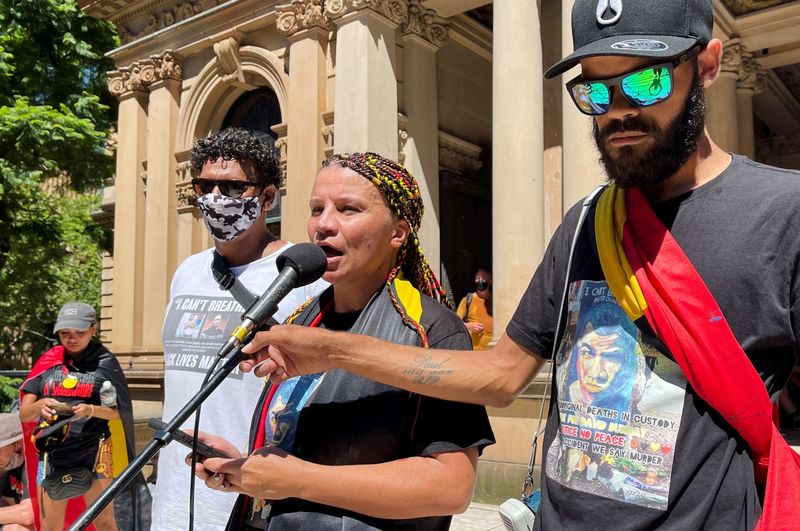By Lidia Kelly
MELBOURNE -Thousands rallied against the mistreatment of Indigenous people across Australia on Wednesday as citizenship ceremonies took place to mark the country’s national day intended to celebrate the birth of modern Australia.
The Jan. 26 public holiday marks the date the British fleet sailed into Sydney Harbour in 1788 to start a penal colony, viewing the land as unoccupied despite encountering settlements.
But for many Indigenous Australians, who trace their lineage on the continent back 50,000 years, it is “Invasion Day”.
Many protesters at rallies across cities dressed in black to mourn the day, with some carrying the Aboriginal flag and “change the date” signs. Some protests were organised online amidst concerns of surging COVID-19 cases.
A monument depicting Captain James Cook, who arrived in the Pacific 252 years ago triggering British colonisation of the region, was doused in red paint overnight in Melbourne.
Speaking at the national flag-raising and citizenship ceremony in Australia’s capital, Canberra, Prime Minister Scott Morrison honoured the traditional custodians of the country.
“We recognise Indigenous peoples right across our land from the Torres Strait Islander people in the north, to the people in Tasmania, to the people across the Nullarbor in Perth and the Larrakia people in the Top End,” Morrison said.
“Like the country itself, Australia’s Aboriginal and Torres Strait Islander peoples are diverse, they’re unique and they connect us through time.”
While the Australian Day remains contentious, this week’s poll by the market research company Roy Morgan showed nearly two-thirds of Australians say that Jan. 26 should be considered “Australia Day”. The rest say it should be “Invasion Day.”
Australia’s 700,000 or so Indigenous people track near the bottom of its 25 million citizens in almost every economic and social indicator. Living often in remote communities, they also have been at greater risk from COVID.
Most of the 200 or so Aboriginal communities spread across Western Australia are closed to tourists and travellers.
The main Aboriginal health body of Central Australia, a vast outback region in the Northern Territory centred on the town of Alice Springs, called on Tuesday for a “complete lockdown” of the area to prevent the spread of the coronavirus.
The Northern Territory, home to about 247,000 people, recorded 492 new cases on Wednesday, bringing the total number of active cases to 3,208, with 84 people in hospitals.
Australia on Wednesday recorded at least 87 deaths from the virus, the highest number of COVID deaths in a day since the start of the pandemic, as the highly-infections Omicron variant tore through the country.
(Reporting by Lidia Kelly; Editing by Himani Sarkar)



